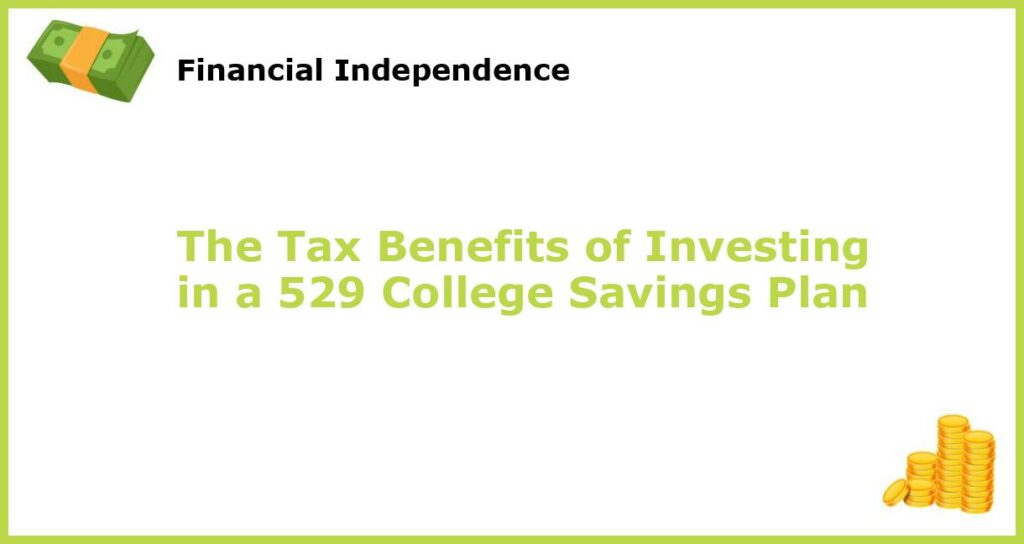Are you or someone you know planning for college expenses? One of the most effective ways to save for these costs is through a 529 College Savings Plan. Not only does it provide tax benefits, but it also allows investors to start saving early, reducing the need for student loans later on. Let’s take a closer look at the tax benefits of investing in such a plan.
1. What is a 529 College Savings Plan?

A 529 College Savings Plan is a state-run investment account designed specifically to help families save money for college expenses. Its name comes from Section 529 of the Internal Revenue Code and is designed to allow contributions to grow tax-free while withdrawals are also tax-free when used for qualified education expenses. While individual states run these plans, you are free to choose the state plan that works best for you, regardless of where you live or where your beneficiary plans to attend college.
2. How do the tax benefits work?

One of the most significant benefits of investing in a 529 plan are the tax benefits. There are two of these, each designed to help families stretch their savings just a bit further. Firstly, contributions to the account are considered a tax-free gift, so they’re eligible for the annual gift tax exclusion. This simply means that contributions you make to the account can be a tax write-off. Secondly, the earnings in the account grow tax-free, as long as the money is used for qualified education expenses.
3. What are qualified education expenses?

Qualified education expenses include tuition, fees, books, supplies, and equipment required for enrollment or attendance at an eligible educational institution. In addition, certain room and board expenses may be considered qualified if the student is enrolled at least half-time. Essentially, any expense that directly contributes to a beneficiary’s education can be paid for using funds from a 529 plan.
4. Can anyone contribute to a 529 plan?

The great thing about 529 plans is that anyone can contribute to them, including parents, grandparents, relatives, friends, or even the beneficiary themselves. There are no income restrictions on contributions, making this type of plan accessible to a wide range of investors. That said, there’s always a maximum amount you can contribute.
5. Is there a limit to how much you can contribute?

While 529 plans do typically have high contribution limits – and these limits vary slightly from state to state – the IRS does impose a cap for each beneficiary. This can be over $300,000 in some cases; however, contributions above $15,000 per year may trigger gift tax consequences and require the filing of a gift tax return.
6. What if the money isn’t used for qualified education expenses?
If the money in a 529 plan is not used for qualified education expenses, then it may be subject to income tax and an additional 10% penalty on any earnings. This is the drawback to this kind of savings plan, and it is to incentivize you to use the money specifically for educational costs. However, there are exceptions to this rule, such as if the beneficiary receives a scholarship or attends a military academy.
7. Can you change the beneficiary of the account?
A great feature of a 529 plan is that the account owner can change the beneficiary of the account to another member of the original beneficiary’s family, at any time without penalty. This means that if your first intended beneficiary decides not to go to college, you can still save the money for their younger sibling or another family member.
8. What happens if the beneficiary doesn’t go to college?
If the beneficiary of a 529 plan does not go to college, then the account owner may choose to change the beneficiary to another family member or withdraw the money for non-qualified expenses. However, do bear in mind that if the money is withdrawn for non-qualified expenses, then taxes and penalties may apply. Either way, the money saved is not lost.
9. Are 529 plans available in every state?
Yes, every state offers at least one 529 plan. However, some restrictions or residency requirements may apply. To find out more about what the plan has to offer or any potential limitations, consult both the plan and the state’s laws surrounding it.
10. Why invest in a 529 plan?
A 529 College Savings Plan is one of the most effective ways to save for college expenses. In addition to providing generous tax benefits, starting to save early can make a huge difference in the long run. Reducing the need for student loans later on can drastically improve your financial outlook. Starting to invest early in a 529 plan today guarantees your family’s financial future.







